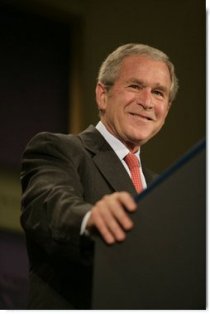US President George Bush yesterday announced plans for a series of meetings between the top 15 greenhouse gas-emitting countries with the intention of setting long-term global and national emissions targets. He was speaking at the US Global Leadership Campaign.
 Under the proposal the countries would create a new framework under which a new long-term goal for greenhouse gas emissions reduction would be developed. Each country would work to achieve this goal by setting its own mid-term national targets and program. Significantly, the group of 15 countries would include China and India, which - like other developing countries - do not have emissions targets under the Kyoto Protocol.
Under the proposal the countries would create a new framework under which a new long-term goal for greenhouse gas emissions reduction would be developed. Each country would work to achieve this goal by setting its own mid-term national targets and program. Significantly, the group of 15 countries would include China and India, which - like other developing countries - do not have emissions targets under the Kyoto Protocol.
A review process would be set up to assess each country's progress towards achieving the goals of the framework. It is proposed that the emissions goals would be set by the end of 2008.
The proposals put a lot of emphasis on actions to achieve these goals, including measures in sustainable forestry and forest protection, energy efficiency and advances in global transfer and adoption of clean energy technologies.
The American President highlighted the contribution of nuclear energy, saying that the USA was "spending a lot of money on clean, safe nuclear power. If you're truly interested in cleaning up the environment, or interested in renewable sources of energy, the best way to do so is through safe nuclear power."
He also noted investment in new technologies to produce electricity in cleaner ways, including solar and wind energy and clean coal technologies.
The President's initiative comes a week before discussions on climate change are due to form a significant part of the G8 discussions, to be held in Heiligendamm, Germany. Recent reports have suggested significant disagreements between the USA and other G8 members on a draft text on climate change.
The White House stressed that the USA remains committed to the UN Framework Convention on Climate Change (UNFCCC) and that the new framework was intended to complement the ongoing UN activity, as well as advancing US relations with the Asia-Pacific Partnership. However the President said that the framework would come into effect when "the Kyoto Protocol expires in 2012," whereas discussions have already started under the UNFCCC process on developing new emissions targets beyond 2012 for developed countries.
There is no indication yet as to whether the proposed emissions targets would be enforced through a binding legal agreement or whether they would be absolute targets or targets linked to GDP.
UK prime minister Tony Blair described the announcement as "what we have been working for all the way through" as it would involve America as well as China and India. Germany's Angela Merkel described it as a "step in the right direction." However, EU Commission President Jose Manuel Barroso said that Bush should show more ambition on climate change.
Australian Foreign Minister, Alexander Downer, said Australia would be "a willing participant" in the latest initiative.
Shinzo Abe, Japan's prime minister, said in reaction to the Bush proposals that he believed the United States is "finally getting serious in dealing with global warming ." Abe last week launched Japan's own plan for an inclusive but non-binding arrangement aimed at halving global greenhouse gas emissions by 2050.
Further information
WNA's Policy Responses to Climate Change information paper














